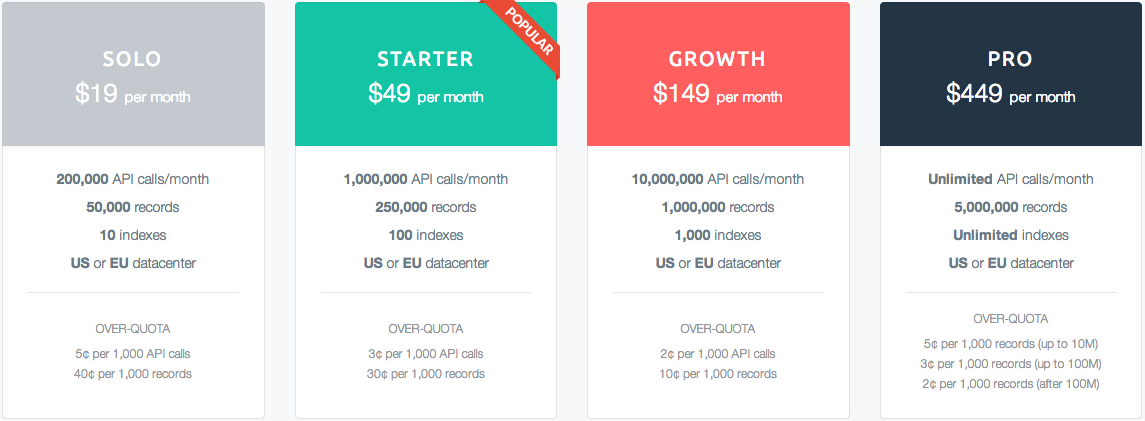
French startup Algolia provides a real-time search API that makes the search function on your website sexy. Now Y Combinator-backed, it’s faster than anything you’ve seen before — everything happens in real time, and results change with each keystroke.
“We first started with an offline search engine that would work well on mobile,” co-founder and CEO Nicolas Dessaigne told me in a phone interview. “It worked but wasn’t a success. Many people wanted us to run the search queries on our servers, so that’s what we did.”
Algolia is a developer-friendly hosted search engine for database objects. It will suit your needs perfectly if you run a sport results website, an e-commerce store, a movie database, a CRM, or any website that relies on small chunks of text (not big pages of text like Wikipedia or TechCrunch). Until now, there wasn’t any framework or API that was optimized for this kind of a database — Swiftype, Searchify and others all rely on big data-oriented Elasticsearch.
The installation process is very reminiscent of integrating Stripe for credit card payments — adding Algolia’s search engine is just a matter of adding a few lines of code. You can see all that in the live demo.
But how do you get data into the search engine? Algolia works with JSON-formatted queries. After your first setup, you can update your data whenever you want. For example, if you want to order your results by the number of likes on videos, you can easily update those likes to keep your search engine up to date.
Configuring takes a matter of minutes, as well, as Algolia already handles search and typos by default. All you have to do is say what attribute is the most important one. You can choose other ranking criteria, such as popularity, geolocation data, tags, dates, etc.
After that, your users can start searching right away. They will interact with Algolia’s servers without ever leaving your site. With two different data centers in the U.S. and Europe, Algolia tries to make the experience as responsive as possible for its users.
While the installation process is easy, switching to Algolia is mainly a matter of greatly improving the user experience. On most websites, search is a painful process. You don’t know what query you should type. When you hit enter, your browser takes you to a separate result page. Most of the time, what you were looking for is not even on this page. At this point, you reluctantly turn to Google and type your query followed by the name of the website you were browsing.
Compare your average website to Algolia; it’s night and day — Algolia feels like using OS X’s Spotlight feature on the web.
Search on the web has been broken for a while, and Algolia knows that. That’s why the company even created Search Grader, a way to grade your search engine based on a series of factors. YouTube is at 88 out of 100, Facebook is at 75, Yelp is at 62. Even well-known websites that rely a lot on search have a pretty bad rank: Airbnb gets a 48/100, and Vimeo only gets 31.
Compare your average website to Algolia; it’s night and day — Algolia feels like using OS X’s Spotlight feature on the web. You can also use the service to power your search feature in your mobile app. The user experience is pretty similar. Algolia customers include TVShow Time and Socialcam. Soon, the Pebble appstore will use Algolia as well.
When it comes to pricing, the startup uses a traditional quota and tier system. It starts at $19 a month and can cost more than $449 per month if your website gets a lot of traffic. Here’s the full breakdown:

So far, the company has raised $1.6 million (€1.2 million) from Index Ventures, Alven Capital and Point Nine Capital. A member of Paris accelerator TheFamily, Algolia was also recently accepted into Y Combinator’s latest batch.
The next step for the company is probably to fine-tune its product in order to attract big-name customers. Y Combinator will help it get in front of many big Silicon Valley clients.
Finally, here’s a hack called Twitter Handles Search — it does exactly what the name suggests. But it works much better than the default user search feature on Twitter, probably because the company couldn’t find a good open-source database object search framework. In the end, it’s all about using the right tools for your needs — and Algolia provides an important missing tool for developers.